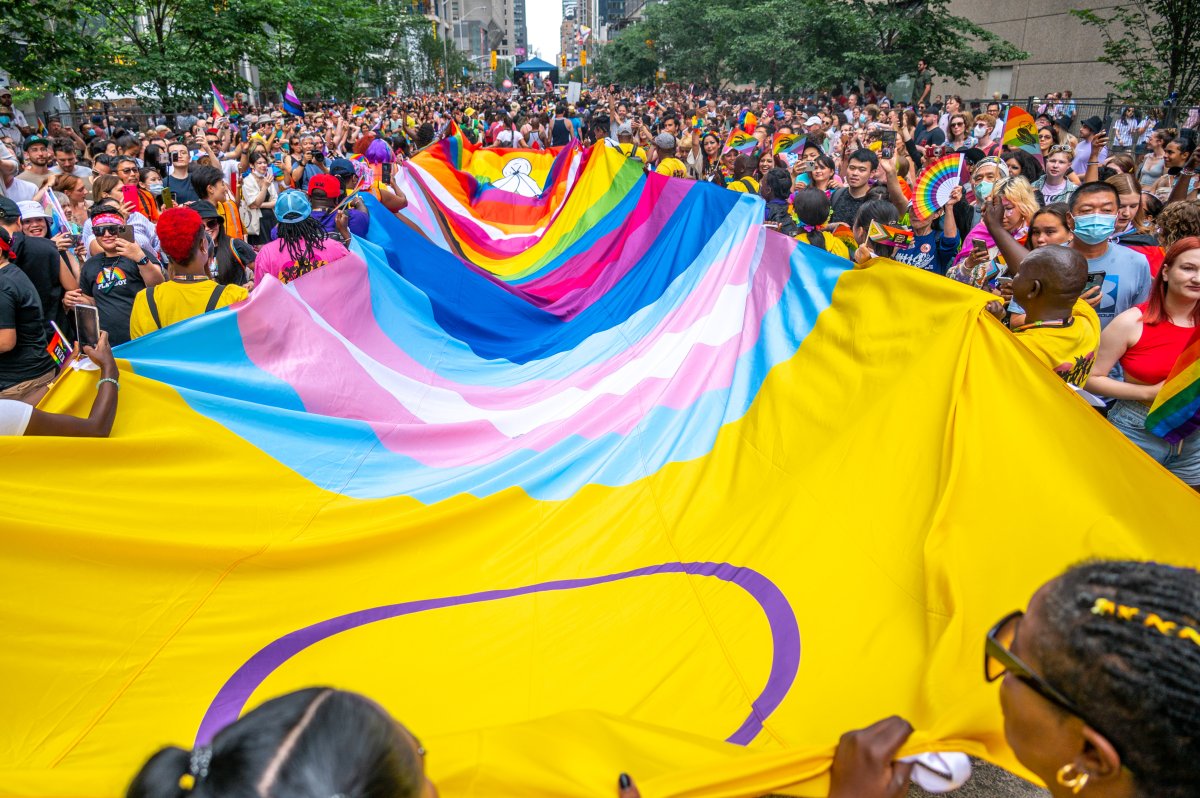Attend any Pride parade throughout Canada this month and you’ll likely be handed an armful of free, branded swag.

From a phone charger stamped with the name of one of the biggest financial institutions in the country to a rainbow-coloured pair of sunglasses marked with a business logo, brands are very present at Pride and they want you to know about it.
To some, this showy form of support for LGBTQ2+ communities has a name: rainbow capitalism.
Rainbow capitalism, also called pink-washing or homocapitalism, describes the commercialization of LGBTQ2+ spaces, including Pride celebrations. Through marketing, rainbow capitalism sees companies commodify aspects of LGBTQ2+ identity to sell products back to a historically marginalized community that is steadily growing in purchasing power.
People across the political spectrum — including both those who support and oppose LGBTQ2+ rights — have taken issue with rainbow capitalism.
Many in the LGBTQ2+ community feel rainbow capitalism not only panders, but obscures the real reason behind celebrations like Pride, thus robbing the event of its intended purpose. After all, Pride exists to celebrate the work of the predominantly Black and brown trans women who have fought for equality since well before the Stonewall riots.
On the flip side, the historically right-wing opposition to gay and transgender rights has recently called for boycotts of brands that support or partner with LGBTQ2+ folks.
Most famously Bud Light, owned by the brand Anheuser-Busch, recently lost its place as the number-one beer brand in the U.S. after it partnered with transgender influencer Dylan Mulvaney for a single Instagram post. The post angered transphobes, many of whom got rid of their Bud Light stockpiles and called for a boycott of the brand. In the end, Bud Light appeared to backtrack on the partnership with Mulvaney and released a statement saying it “never intended to be part of a discussion that divides people.”
The American retail giant Target also faced transphobic outrage and threats of boycotts last month over a number of its LGBTQ2+-themed products. The company eventually folded under the pressure and moved its Pride displays to the back of the store in many southern U.S. states.
When brands and corporations that claim to be fierce allies backtrack as a result of transphobic or homophobic pressure, their allyship is cheapened and looks opportunistic. It can trigger speculation from LGBTQ2+ purchasers, who may now wonder what’s more important: their fundamental rights or the output of their wallets.
Pride on the homefront
- N.S. mom calls for better ultrasound access after private clinic reveals twins
- 3 women diagnosed with HIV after ‘vampire facials’ at unlicensed U.S. spa
- Posters promoting ‘Steal From Loblaws Day’ are circulating. How did we get here?
- As Canada’s tax deadline nears, what happens if you don’t file your return?
Massive celebrations like Pride are expensive and someone has to help foot the bill. To pay, Canadian Pride organizers often turn to corporate sponsorships, a role that Simon Gamache, the executive director of Montréal Pride, says is about more than just appearances.
Gamache says there’s a difference between rainbow capitalism and true allyship, namely that the latter requires consistent support for LGBTQ2+ folks, even amid difficult times of upheaval, like the seemingly endless transphobic rhetoric being spread in North America in politics and via social media. To do otherwise is tokenism, Gamache says.
“We’re allergic to tokenism,” Gamache joked of Montréal Pride. “We can smell it.”
Gamache and his colleagues use a keen nose to develop sponsorship agreements with businesses that not only want to advertise at Pride but protect and uplift LGBTQ2+ employees within their own organizations.
Gamache and his counterpart at Pride Toronto, Executive Director Sherwin Modeste, both agreed that a background check into wannabe-sponsors is vital to maintaining and bolstering acceptance and progress at Pride celebrations and beyond.
Modeste says Pride sponsors need to prove that they are allies to LGBTQ2+ people not just in June, but “365 days a year.”
“What we do not want is folks taking advantage of the community,” he says. “Rather, we need to really help people to better serve the LGBTQ community.”
Both Montréal and Toronto Pride place potential corporate sponsors under a microscope. It is important to verify if LGBTQ2+ employees within prospective companies are protected by systems already in place, like an affinity group. It’s not enough to just have a queer network; these employees must also be heard by executives at the top of the company, and therefore able to advocate for real change.
“It’s not about the money,” Gamache says. Montréal Pride, he says, has turned down several lucrative, multi-year sponsorship contracts in the past because companies did not meet their standards.
But if a brand doesn’t qualify to sponsor Pride, that doesn’t mean they’ll be kicked to the curb.
Modeste says Pride Toronto and counterparts across the country will often work with rejected sponsors to create and implement policies and protections for LGBTQ2+ employees within that organization.
“That doesn’t mean we will not work with them, but we will not take money from them because they need to go back and do their due diligence,” Modeste says.
Global News asked Modeste how, then, it’s possible for a company like Home Depot — which donated US$1,825,500 to 111 anti-gay politicians in 2017 to 2018 — to be a sponsor of Pride Toronto this year. (Home Depot has long since donated to both Republican and Democratic candidates in the U.S., a popular strategy some corporations use to try and hedge political bets.)
Modeste was quick to answer that Pride Toronto works only with the company’s geographical subset, Home Depot Canada. He noted Home Depot in the U.S. is a “whole different company.”
“We have seen the leadership of Home Depot Canada. We have seen the employee network grow. We have looked at their HR policies. And clearly, Canada is in a whole different space, and this is why we are comfortable to work with Home Depot Canada,” Modeste says.
Gamache and Modeste both say they haven’t experienced any sponsorship fallout as a result of the Bud Light controversy (and others) in the States. Instead, Gamache says some of his longtime sponsors have stepped up, inquiring how they can support necessary services like security at Pride events across the country.
“They’re paying attention, and that’s a sign of really good allyship,” Gamache says.
“It is expensive and it’s getting more and more expensive,” he says of putting on Montréal Pride. “If those companies are helping us do that? Great. I have no problem with that.”
What more can be done?
Modeste called on local, provincial and federal governments to invest capital in Canadian Pride organizations.
“In terms of tax revenue, Pride’s bringing in so much money into the economy. However, many Prides rely 80 to 90 per cent on sponsorship to make things happen,” he says.
Government money could provide a double benefit: On top of supporting LGBTQ2+ rights and making queer citizenry more comfortable in their daily lives, it might even be profitable to invest in Pride.

For now, Pride organizers work tirelessly to create fun, safe and empowering celebrations in Canada. Gamache said his group consistently battles burnout, as they are LGBTQ2+ people advocating for their very own rights.
“We’re constantly fighting and it’s tough as hell. We’re being attacked, mostly online, and when this happens, we need strong allies that will not only be with us, but will be in front of us and say, ‘This has to stop,’” Gamache says.
“Allyship is fundamental. We need real allies more than ever.”













Comments